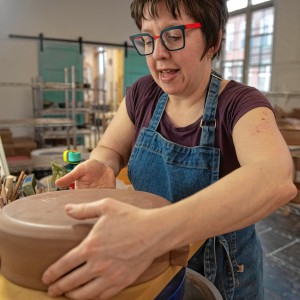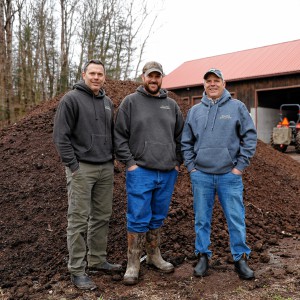Book Bag: ‘Once We Were Home’ by Jennifer Rosner; two talks by writer and Native historian Margaret Bruchac
| Published: 03-02-2023 3:20 PM |
Once We Were Home
By Jennifer Rosner, Flatiron Books
Northampton author Jennifer Rosner made a strong debut in 2020 with her first novel, “The Yellow Bird Sings,” a story set in Poland during World War II, in which a Jewish mother and daughter are forced to hide from the Nazis in a farmer’s barn.
The novel, a finalist for the National Jewish Book Award, explored the bond between the mother, Róza, and her 5-year-old daughter, Shira, who Róza must keep entertained by whispering her stories and teaching her the fundamentals of reading music — by using small pieces of hay to show Shira the differences between whole, half and quarter notes.
But Róza eventually will be forced to make a terrible decision: either stay with Shira, or give her a better opportunity to survive apart from her.
In her new novel, “Once We Were Home,” Rosner expands on that latter issue, introducing a number of children who during the war are separated from their parents, sometimes to be hidden from the Germans.
But the novel mostly focuses on their postwar lives, as they navigate the trauma of loss and their sense of identity becomes increasingly fragmented. As their stories later converge in Israel, the characters face ongoing questions: Who are they, and to whom do they belong?
Article continues after...
Yesterday's Most Read Articles
Rosner, who has also written nonfiction, notes that her book is based on real-life accounts, including those of Jewish organizations that, after the war, took Jewish children — sometimes secretly or forcibly — from Christian homes and churches that had sheltered them, then smuggled the children to Israel.
The premise of this “redemption” movement, Rosner notes, was to preserve as much of Jewish culture as possible after the murder of so many European Jews during the Holocaust.
Yet during the war, the Nazis, she says, also kidnapped uncounted numbers of “Aryan-looking” children, especially from Poland, and placed them in German homes. And in some cases, churches that had safeguarded Jewish children wanted to Christianize them and were reluctant to return the children to any surviving relatives when the war ended.
Consider Roger, one of the central characters of “Once We Were Home.” It’s 1946, and he lives in a convent in southern France where he was hidden after the Germans killed his parents. He’s a thoughtful boy who’s interested in prayer, learning Latin, and other aspects of the Christian world, though he wonders if God can truly save him if the lord couldn’t save his parents.
Then Roger is suddenly whisked off to Spain by one of the priests — they make an epic trek on foot over the Pyrenees Mountains — for reasons Roger doesn’t understand. It turns out he has an aunt who survived the war and has sued for his return, yet the church is determined to try and keep him to “save his soul.”
Then there are Mira and Daniel, a sister and her younger brother, who in 1942 are smuggled out of a Jewish ghetto in Poland to stay with a Polish family in the country. It’s a crushing scene, as 7-year-old Mira can’t understand what’s happening: “Mama, what’s the matter? Where are we going?”
“Please, promise again you’ll take care of Daniel,” her mother pleads. “I need you to be safe until I can come get you.”
Under the care of a Polish couple, Agata and Jozef, the children are given new names, Anastazja (Ana) and Oskar, and a cover story for their appearance at the farm. Oskar, just 3 years old, will grow attached to this new family and forget his original one; while Ana longs to be reunited with her mother and father, even as she comes to care for Agata and Jozef.
That division between brother and sister will only grow in the ensuing years, as they both end up being taken from the home and spirited to Israel in the late 1940s. Even among fellow Jews again, Ana and Oskar — and then Roger — don’t really feel at home. At this point, what is home supposed to mean?
“Roger still feels as if he’s afloat between worlds, watching,” Rosner writes. “Hebrew is an utter mystery … a spoken conversation, even when friendly, sounds like a squabble bordering on a fight. He’s both circumcised and baptized … What he is, is mixed-up.”
“Once We Were Home” steadily builds the characters’ emotional challenges as the story moves into the 1950s and 1960s and Ana, Oskar and Roger become adults and try to find their way in a new world. Ana, who’s now on her third name — the Hebrew “Chani” — will discover another mystery from her past that will deeply unsettle her after she becomes a young mother herself.
Rosner also introduces an adult character, Renata, a post-graduate student who comes to Israel from England in 1968 to work on an archaeological dig. Still mourning the recent death of her mother, Renata’s aware that her mother never explained why they left Germany so quickly when Renata was a little girl in the 1940s.
Now, in a country filled with survivors of Germany’s darkest era, Renata will have to revisit that past as her path crosses that of people whose lives were uprooted by the war.
“Once We Were Home” is in a sense an extension of “The Yellow Bird Sings,” and Rosner employs the same lyrical prose style that seems especially suited to capturing the thoughts and feelings of children.
As one reviewer puts it, the novel “is about the ways we seek family despite the wounds we carry. The stories of [Rosner’s] characters fit beautifully together like nesting boxes, building to become an ode to love in its many forms.”
Jennifer Rosner will visit the Odyssey Bookshop in South Hadley on March 14 at 7 p.m. for a book launch.
In other writing-related news: Margaret Bruchac, a writer and associate professor of anthropology at the University of Pennsylvania, will give two talks in the area on methods for Indigenous people to recover their histories and stories.
Bruchac, a former Northampton resident who is Nulhegan Abenaki, will speak March 4 at 4 p.m. at the Shea Theater in Turners Falls on “Native Memories: Recovering Pocumtuck Histories in Franklin County,” a program sponsored by New England Public Media and the Nolumbeka Project.
And Bruchac, who is also the coordinator of Native American and Indigenous Studies at the University of Pennsylvania, will offer a Zoom-based talk March 9 at 7 p.m., sponsored by Historic Northampton, called “Nonotuck to Northampton: Recovering Indigenous Histories.”
The Shea Theater event, according to press notes, will “explore how local Native histories are better understood by critically analyzing colonial documents, revisiting Indigenous landscapes, and dismantling myths and stereotypes that push Native people into the vanished past.”
The talk will be followed by a Q & A with Bruchac.
Elizabeth Sharpe, co-director of Historic Northampton, says Bruchac has researched and written a broad new chapter for the museum’s website on Indigenous and Native histories. For the March 9 Zoom presentation, Bruchac will discuss her research and take questions.
You can register for the event — sliding scale admission is $5-25 — by visiting historicnorthampton.org and clicking on the link for “programs.”

 Hitting the ceramic circuit: Asparagus Valley Pottery Trail turns 20 years old, April 27-28
Hitting the ceramic circuit: Asparagus Valley Pottery Trail turns 20 years old, April 27-28 Best Bites: A familiar feast: The Passover Seder traditions and tastes my family holds dear
Best Bites: A familiar feast: The Passover Seder traditions and tastes my family holds dear Valley Bounty: Your soil will thank you: As garden season gets underway, Whately farm provides ‘black gold’ to many
Valley Bounty: Your soil will thank you: As garden season gets underway, Whately farm provides ‘black gold’ to many Painting a more complete picture: ‘Unnamed Figures’ highlights Black presence and absence in early American history
Painting a more complete picture: ‘Unnamed Figures’ highlights Black presence and absence in early American history
